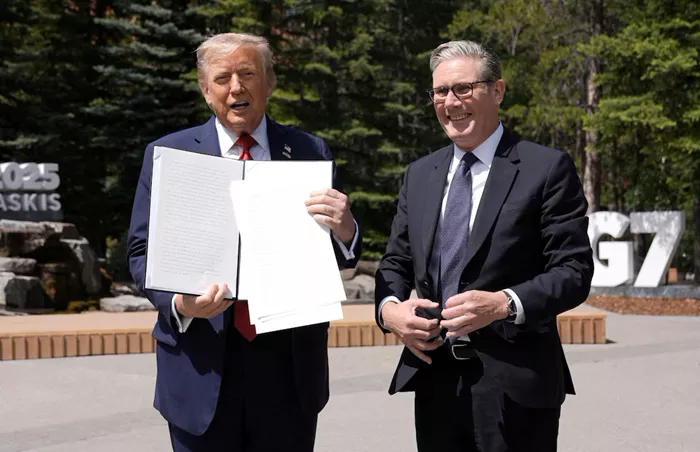President Donald Trump and British Prime Minister Keir Starmer signed a trade agreement at the G7 summit in Canada, formalizing a deal reached last month. Trump praised the US-UK relationship as “just fantastic” and declared, “We signed it and it’s done.”
The deal reduces tariffs on British car and aerospace imports. However, tariffs on steel and aluminum remain unresolved, with further talks ongoing to finalize those details.
The agreement marks a significant step in US-UK trade relations, aiming to boost jobs and income on both sides. Starmer expressed optimism, calling the deal a “very positive day” and confirming it addresses tariffs on automobiles and aerospace sectors.
Meanwhile, the US failed to reach a trade agreement with Japan during the summit. Japanese Prime Minister Shigeru Ishiba noted unresolved issues, stating, “there are still some points on which the two sides are not on the same page.”
Trade talks with the European Union and Canada also continue this week, with the US considering tariff adjustments. The EU denied reports suggesting it might accept a baseline 10% US tariff on all its exports.
Trump indicated a possible trade deal with Canada, highlighting differences in tariff approaches with Canadian Prime Minister Mark Carney but expressing hope for progress.
The US is under pressure to finalize deals before a July 9 deadline, when a pause on some tariffs is set to expire. Failure to reach agreements could lead to tariff increases, raising concerns about trade tensions escalating again.
In parallel, the US and China made progress by agreeing on a framework to ease tariff and trade tensions, particularly on rare earth mineral exports.
Trump mentioned a combined 55% tariff rate on Chinese goods, which reflects existing duties rather than new tariffs. A federal appeals court recently upheld the temporary continuation of Trump’s tariffs.
Related topics:
US Stock Futures Fall Amid Iran Conflict and Trade Policy Concerns


